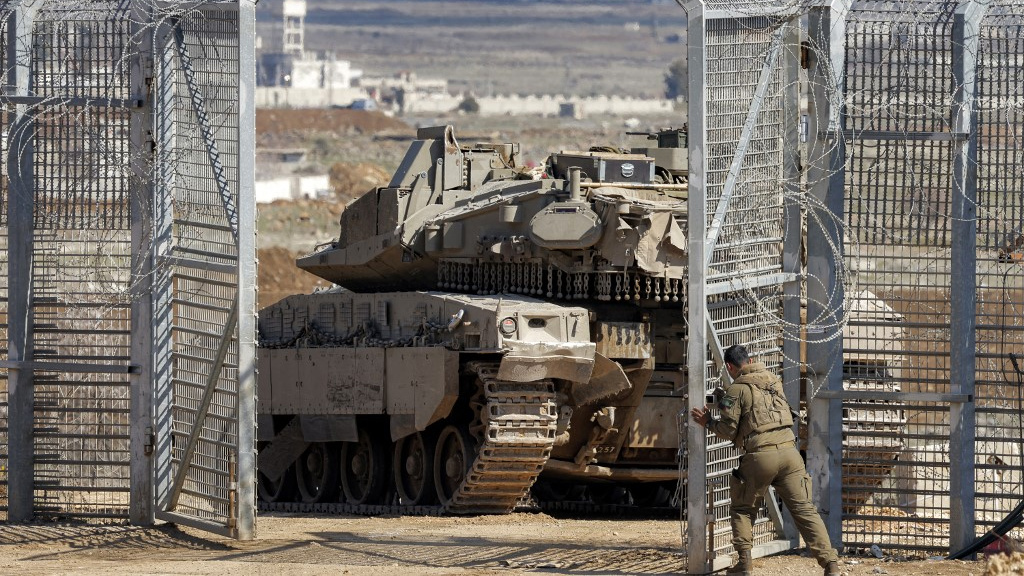Recent reports that Syria’s interim government is engaging in discussions with Israel on a security deal, which could determine the future of the occupied Golan Heights and the recently expanded Israeli “buffer zone”, demand careful scrutiny.
Any such deal must be firmly grounded in the legal status of the occupied Golan Heights, while acknowledging the profound human costs of decades of conflict. Disregarding these fundamental considerations would not only undermine international law, but also exceed the limited mandate of Syria’s unelected transitional authorities.
The status of the Golan Heights under international law is unambiguous. The territory, seized by Israel during the 1967 war, remains occupied Syrian land.
UN Security Council Resolution 242 (1967) called for the withdrawal of Israeli armed forces from territories occupied during the conflict, a principle reaffirmed by Resolution 338 (1973) and explicitly reinforced by Resolution 497 (1981), which declared Israel’s unilateral annexation of the Golan Heights “null and void and without international legal effect”.
The continued Israeli presence in the Golan Heights, alongside the imposition of its laws and expansion of its settlements, constitute clear violations of international law, including the Fourth Geneva Convention, which prohibits the occupying power from transferring its civilian population into occupied territory.
New MEE newsletter: Jerusalem Dispatch
Sign up to get the latest insights and analysis on
Israel-Palestine, alongside Turkey Unpacked and other MEE newsletters
Israel’s expansion last year of its buffer zone in Syria, while framed as a measure to maintain “stability”, represents an additional layer of de facto territorial fragmentation, further entrenching the occupation and undermining Syria’s sovereignty.
But the illegality of the occupation extends beyond legal declarations, inflicting profound human suffering.
Humanitarian crisis
The seizure of the Golan Heights in 1967 resulted in the forced displacement of around 130,000 Syrians. Decades later, they and their descendants remain displaced, deprived of their internationally guaranteed right to return home.
The humanitarian crisis has been exacerbated by the expropriation of their properties, and by the socioeconomic hardships caused by prolonged displacement and life under the Assad regime. A legitimate agreement on the Golan Heights cannot ignore these realities, nor can it sidestep the legal obligations concerning the rights of displaced persons.
Syria’s interim government cannot legally conclude an agreement that alters the nation’s sovereign borders
The Druze community that remains in the occupied Golan Heights – more than 20,000 people – continues to endure significant hardships. Beyond systematic discrimination and land confiscation, Israeli policies have imposed a more intimate form of suffering: the separation of families.
For decades, Druze residents of the occupied Golan Heights have been subject to Israeli legal restrictions that severely limit or prohibit contact with relatives residing in Syria.
Families have been torn apart, with members prevented from attending funerals and weddings, or even from maintaining basic communication across the armistice line. Such policies are a clear violation of fundamental human rights, including the right to family life.
Syria’s interim government, lacking both democratic legitimacy and constitutional authority, cannot legally conclude an agreement that alters the nation’s sovereign borders. Only a representative government elected by the people may undertake decisions that affect territorial integrity.
Any attempt by an interim authority to formalise the loss or compromising of Syrian land, especially under conditions of foreign occupation, would thus be legally null, contrary to both Syria’s constitutional framework and international legal principles.
Dignity and rights
There is no doubt that Syria is in urgent need of stability, reconstruction and national reconciliation. After more than a decade of devastating conflict, the Syrian people deserve a future built on peace and prosperity.

Golan Heights: Why the Israeli-occupied Syrian territory matters
Read More »
But that future must emerge from the ashes of the Syrian tragedy – not from transactional politics that offer up “gifts” of sovereignty and territory in exchange for fleeting political power or international recognition.
Territorial integrity is not a bargaining chip for temporary authorities seeking to consolidate power. It is a fundamental component of statehood, protected under international law, and inseparable from the dignity and rights of the Syrian people.
The Golan Heights remains occupied Syrian territory. Its future cannot – and must not – be determined by an interim government lacking democratic legitimacy and constitutional authority. The suffering of refugees and the Druze community cannot be brushed aside in pursuit of superficial stability or political expediency.
International law, including binding UN resolutions, rejects the acquisition of territory by force, and upholds the rights of displaced persons. These principles must guide any genuine path towards stability and justice in Syria.
The international community, as well as Syrians across political and geographic divides, must remain vigilant. The Golan Heights is not a token for political survival – it is a national cause, a legal obligation, and a symbol of Syria’s right to sovereignty, dignity and self-determination.
The views expressed in this article belong to the author and do not necessarily reflect the editorial policy of Middle East Eye.

